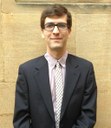New Faces in Political Methodology XI was held on Saturday, April 27, 2019
Since 2008, Penn State has been proud to host New Faces in Political Methodology, a conference that invites an eclectic group of graduate students and postdoctoral fellows to come together and discuss their methodology and methodology-adjacent work with each other and with the multi-disciplinary social science methodology and social data analytics communities at Penn State.
In total, 92 early career scholars from 33 different graduate programs have been featured as "New Faces."
New Faces in Political Methodology XI featured 8 early career scholars:
- 9:00 - 9:15 Opening remarks
- 9:15 - 10:00 Sarah Shugars (Northeastern University) "The Structure of Reasoning: Inferring Conceptual Networks from Free Response Text."
- 10:00 - 10:45 Pedro Rodríguez (New York University) "Word Embeddings: What Works, What Doesn’t, and How to Tell the Difference for Applied Research."
- 10:45 - 11:00 Coffee break
- 11:00 - 11:45 Erin Rossiter (Washington University in St. Louis) "Measuring Agenda-Setting Power in Political Discourse."
- 11:45 - 12:30 Markus Neumann(Pennsylvania State University) "Hooked With Phonetics: The Strategic Use of Style-Shifting in Political Rhetoric."
- 12:30 - 1:30 Lunch
- 1:30 - 2:15 Therese Anders (University of Southern California) "Territorial Control in Civil Wars: Theory and Measurement Using Machine Learning."
- 2:15 - 3:00 Rachael McLellan (Princeton University) "Local Control: How Opposition Support Constrains Non-Democratic Incumbents."
- 3:00 - 3:15 Coffee break
- 3:15 - 4:00 Desmond Wallace (University of Iowa) "The Diffusion of Representation: How Policy Interdependence Influences Policy Responsiveness."
- 4:00 - 4:45 Max Goplerud (Harvard University) "Modelling Heterogeneity Using Complex Sparsity."
 Therese Anders (University of Southern California)
Therese Anders (University of Southern California)
"Territorial Control in Civil Wars: Theory and Measurement Using Machine Learning."
Therese Anders is a Ph.D. candidate in Political Science and International Relations at the University of Southern California. Her core research focuses on the conceptualization and development of new estimates of territorial control and subnational conflict exposure in civil wars using machine learning and geo-coded event data. The paper introducing the methodology received the Kenneth Boulding award from the International Studies Association Peace Studies section. She served as Director of Research and Training for USC’s Security and Political Economy Laband will be working with RStudio on a project prototyping tools for Calibrated Peer Review in data science classes in the summer 2019. Her work has appeared in Political Psychology, Proceedings of the NIPS 2017 Workshop on Machine Learning for the Developing World,and a chapter in Reasoning of State, a volume published by Cambridge University Press.
Goplerud (Harvard University)
"Modelling Heterogeneity Using Complex Sparsity."
Max Goplerud is a Ph.D. student in the Department of Government at Harvard University and an affiliate of the Institute for Quantitative Social Science. His interests mostly focus on political methodology and legislative politics. He is especially interested in the synthesis of Bayesian methods for non-linear models with machine learning. Current projects focus on interpretable methods for modeling heterogeneity in high-dimensional data and analyzing political text. His work has appeared in Legislative Studies Quarterly, Parliamentary Affairs, Comparative Political Studies, Political Analysis, and the Annual Review of Political Science.

Rachael McLellan (Princeton University)
"Local Control: How Opposition Support Constrains Non-Democratic Incumbents."
Rachael McLellan is a PhD candidate in the Politics Department at Princeton University studying comparative politics. Her dissertation explores how decentralization affects the strategies incumbents and opposition parties use to compete for political support and hence the prospects of democratization in non-democracies. Her work takes a mixed methods approach. She uses administrative data, interviews and survey data with experimental components to identify regime and opposition strategies and trace their effects on contestation and control in post-decentralization Tanzania.
 Markus Neumann (Pennsylvania State University)
Markus Neumann (Pennsylvania State University)
"Hooked With Phonetics: The Strategic Use of Style-Shifting in Political Rhetoric."
Markus Neumann is a Ph.D. candidate in Political Science and Social Data Analytics at Penn State. His research revolves around the application of machine learning and specifically natural language processing methods to social science problems, such as in political communication and representation. His work primarily deals with text and audio data, but also extends to image and network data as well as simulations. His dissertation relies on tools from phonetics, electrical engineering and natural language processing to study how U.S. senators shift their rhetorical style in accordance with the representational needs of their audience.
 Pedro Rodríguez (New York University)
Pedro Rodríguez (New York University)
"Word Embeddings: What Works, What Doesn’t, and How to Tell the Difference for Applied Research." (co-authored with Arthur Spirling.)
Pedro L. Rodríguez is a Ph.D. candidate at New York University. Pedro’s primary research explores the cognitive underpinnings of attitude judgments. Building on the premise that patterns in natural language are informative of the content and organization of memory—the pictures in our heads—in his dissertation he develops methods to study the semantic representations of politically charged concepts (e.g. welfare, abortion, justice) and evaluate their role in attitude judgments. His research draws from multiple disciplines including cognitive science, computer science, linguistics and social psychology. Pedro is also broadly interested in the application of computational methods to the social sciences, with emphasis on networks, NLP and machine learning. Pedro will be joining the Data Science Institute at Vanderbilt as a postdoctoral fellow starting Fall 2019.
 Erin Rossiter (Washington University in St. Louis)"Measuring Agenda-Setting Power in Political Discourse."
Erin Rossiter (Washington University in St. Louis)"Measuring Agenda-Setting Power in Political Discourse."
Erin Rossiter is a Ph.D. candidate in the Department of Political Science and an A.M. in Statistics student in the Department of Mathematics and Statistics at Washington University in St. Louis. She broadly studies political methodology, American political behavior, and political communication. Erin’s dissertation evaluates the conditions under which today’s heightened levels of animosity toward members of the opposing party might be reinforced or mitigated by political discussion.
 Sarah Shugars (Northeastern University)
Sarah Shugars (Northeastern University)
"The Structure of Reasoning: Inferring Conceptual Networks from Free Response Text."
Sarah Shugars is a Ph.D. candidate in Network Science at Northeastern University, studying American politics and political methodology. Her research focuses on political behavior, public opinion, and deliberative democracy and engages a range of methods including machine learning, natural language processing, and network science. Her work has appeared in SAGE Open, The Good Society, Proceedings of the North American Chapter of the Association for Computational Linguistics (NAACL), and Transactions of the Association for Computational Linguistics (TACL).
 Desmond Wallace (University of Iowa)
Desmond Wallace (University of Iowa)
"The Diffusion of Representation: How Policy Interdependence Influences Policy Responsiveness."
Desmond Wallace is a Ph.D. candidate in the Department of Political Science at the University of Iowa. He graduated from Coastal Carolina University in May 2013, with degrees in political science and history. Desmond's research and teaching interests focus on the study of American politics and political methodology, including state and national politics, legislatures, bureaucracy, and public opinion.

